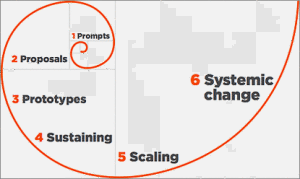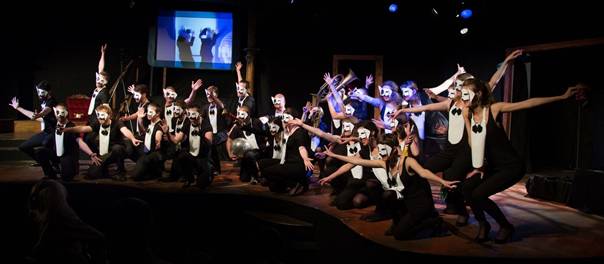
“Upscaling social innovation” is the main concern of all those dealing with the need to operate a transition towards a more sustainable society. How do we ensure that social innovations are maintained and do not fade in time? How can they be supported in their expansion? Should they grow? Should they be replicated? How can new initiatives emerge while learning from the others, but without reinventing the wheel?
The process of social innovation, from its inspiration to the induced systemic change has been nicely designed by the Young foundation[1]. At a strategic and analytical level, it serves as a good basis for providing tools and supports for a variety of stakeholders.
However, they are initiatives, which are totally self-organised, which do not necessarily seek external support, nor would afford such an intrusion in their process. They obviously fall in the realm of the literature and we shall see below how relevant such research is. Still, how can these ensure they operate properly, while using their own, human-based, resources?
I am part of a participatory choir, Zinnechoeur. In such an choir, everybody can be part of its organisation: all the 30 people – altos, soprano, tenors, basses and barytones, as well as the choirmaster – can propose ideas and carry them out. On the paper it is a mix of realised utopia and candy store: everything is possible! For sure, everything is, and that is really the beauty of it. However, we – the chorists and the choirmaster – are all human beings… And as for any kind of grassroots initiative we have been facing some structural issues.
The choir has been functioning for 3 years with on-going experiments for structuring and organising it. The growth in size has shown the need to revise the way it is functioning: from 8 people at the beginning, we are now 30. In addition, the day-to-day management was originally in the hand of two people, fully dedicated to the tasks, who now wish to delegate it. We have faced the need to re-organise the functioning and to become a “self-organised” choir, in addition to the “participatory” one.
We created a body, “the Organisation Committee” in order to deal with the daily management and running of the choir. This Committee is composed of individuals who are also ‘just’ chorists. They can also be part of other “working groups” or initiatives in the choir. Everybody can ask to be in the Committee. Yet, this body appears to be perceived as nebula where decisions are made without notification, and sometimes against the wishes the participants.
We can all propose ideas, but who will carry them out if not us, or the one who initiated it? In other words, how to balance between leaders and followers with a satisfaction of all the members? More than anything else, how can we ensure that every member is empowered and especially responsible for its own – albeit sometimes limited – tasks, without the need to develop a strong management process?
We still seek to adjust emotions and expectations when such a variety of people are gathered, with the aim to spend a relaxing time while singing once a week and at various concerts.
We are facing what any other such type of self-organised structure faces: the dream to be fully integrating everybody’s wishes and experience, without providing an adequate structure for such feedback and on-going exchanges and communication. It is also the false impression that being “participatory” means always reaching unanimous consensus.
We are also experiencing the difficulty to communicate and be transparent in all processes: we all have busy lives and are taking part in this exciting experience in our spare time, and – obviously – on a voluntary basis.
Ensuring that such a choir – or any other kind of grassroots initiative – function and identifies solutions to its problems is not easy. It requires specific skills and competences. It requires members to be able to share their interests and deceptions in a constructive way. It requires being long-term oriented. It requires a positive attitude, being able to talk to each other, in all respect and interest. As for any other social innovation it requires having faith and taking risks, but this is not the issue here: people are committed to what they are doing…. It also requires identifying solutions to problems.
I see two main issues in the other skills that are needed for such as process:
1. During one of our latest discussions, it emerged that one good practice for organising our next concert would be to be structured: to organise meetings with dedicated agendas, minutes – thanks to a secretary – and next steps; and, to set up a retro-planning. Such processes for some might appear too much “work-oriented” and too much constraining. How can we dedicate our free time to tasks similar to those we carry out at work? Is our motivation enough in order to make these tasks enjoyable and not an extra burden?
2. Bringing together people, developing ideas, co-constructing visions and processes all require professional skills. As opposed to a belief yet too common, co-creation is not about everybody working on their own and then the tasks being brought together in a sort of patchwork. We risk to have pieces of clothing unable to be sawn to each other, with an eclectic pattern, not to mention the robustness of the blanket for covering us… Let’s assume we have a member who possesses those skills. Is it possible to be at the same time a member of a grassroots initiative and a facilitator of its processes? On the one hand, where does the legitimacy stop, on the other, where does personal involvement obstruct the neutral role of the facilitator (or should he/she remain neutral…)? If we do not have those skills, what processes can we initiate to hire someone (out of our budget…) or to train ourselves? Guidelines such as the NESTA one on organising meaningful meetings can be useful, but who will read them?…
On a different topic, an article proposed to analyse the functioning on community gardens from a practice theory approach[2]: it shows nicely how these are organized, what are the emerging characteristics and how such a practice is included in everyday routine, together with the role naturally allocate to the members of the garden. Such an analysis is inspiring. It is not prescriptive but, as with the practice approach, it is a good framework for understanding complexity. Now, the question is: how can we provide operationalisable useful tools, based on such academic literature, but reaching out to the grassroots level and providing a fertile ground for experimentation?
References
[1] R. Murray, J. Caulier-Grice, and G. Mulgan, The open book of social innovation. The Young Foundation, NESTA, 2010.
[2] C. Vercauteren, J. N. Quist, E. M. Van Bueren, and E. Veen, “Community gardens as learning spaces for sustainable food practices,” presented at the Proceedings of SCORAI Europe & InContext Workshop, Rotterdam, The Netherlands, 2013, vol. 3.


